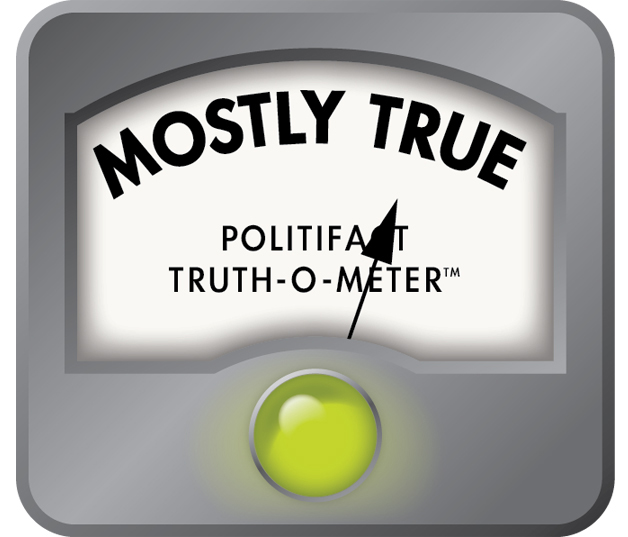Stand up for the facts!
Our only agenda is to publish the truth so you can be an informed participant in democracy.
We need your help.
I would like to contribute

Beto O'Rourke speaks during the general session at the Texas Democratic Convention on June 22, 2018, in Fort Worth, Texas. (AP/Richard W. Rodriguez)
Is Texas one of the nation's most gerrymandered states, as Beto O'Rourke said?
During a visit to HBO’s "Real Time with Bill Maher," Texas Democrat Beto O’Rourke brought up the issue of gerrymandering -- the drawing of district lines to benefit a particular party or group.
"Texas is one of the most gerrymandered states in the union," O’Rourke said during the episode. (It’s at about 2:58 in this video.)
Is that correct? We found that this is more of a fuzzy issue than a precise one, but the evidence suggests that it was not unreasonable for O’Rourke to make this declaration.
"By most objective statistical or mathematical measures, Texas is one of the most gerrymandered states in the U.S.," said Daniel McGlone, a senior analyst with Azavea, a Philadelphia-based firm that has studied congressional district line-drawing.
Michael Li, senior counsel with the Democracy Program at New York University Law School’s Brennan Center for Justice, agreed.
"At the congressional level, it’s fair to say Texas is one of the most skewed" based on partisan bias, Li said.
The hardest part of analyzing O’Rourke’s statement is sorting through countless measurements that can be used, experts said.
"Does he mean gerrymandered by party? By race? Does he mean that the districts don't conform to traditional geographic criteria? You have to define what is meant by ‘gerrymandered’ before you can rank every state on a single scale," said Eric McGhee, a research fellow at the Public Policy Institute of California. (O’Rourke’s staff did not respond to an inquiry for this article.)
Into the void have rushed "legal experts, mathematicians, data scientists and other experts suggesting various metrics or combinations of metrics to score and judge whether a district or plan is gerrymandered," McGlone said.
A 2017 analysis by Azavea used a method called the "efficiency gap," a statistic developed by McGhee and Nicholas Stephanopoulos of the University of Chicago Law School in 2014. It measures how many votes a party "wastes" in a small number of districts. If the district lines had been drawn more efficiently -- essentially, more equitably -- these "wasted" votes could have been used to make other districts more competitive.
Using this method, Azavea ranked Texas as the fifth-most gerrymandered state, behind North Carolina, Pennsylvania, Michigan, and New York.
Another 2017 analysis, by the liberal Brennan Center, found that the three states with the strongest partisan bias in their district lines were Michigan, North Carolina, and Pennsylvania, followed by a second tier that included Florida, Ohio, Virginia -- and Texas, placing O’Rourke’s state in the top seven in this analysis.
A third analysis, from December 2015, was undertaken by Christopher Ingraham, a data specialist previously with the Brookings Institution and the Pew Research Center and now with the Washington Post’s Wonkblog section. Ingraham’s calculation placed Texas seventh, behind California, Pennsylvania, Ohio, New York, North Carolina and Virginia. (All three of these studies looked at Pennsylvania's district lines before they were overturned and redrawn in 2018)
Ranking
Azavea
Brennan Center
Ingraham
1.
North Carolina
Michigan
California
2.
Pennsylvania
North Carolina
Pennsylvania
3.
Michigan
Pennsylvania
Ohio
4.
New York
Featured Fact-check
Florida *
New York
5.
Texas
Ohio *
North Carolina
6.
21-state tie
Texas *
Virginia
7.
--
Virginia *
Texas
8.
--
Not specified
Michigan
9.
--
--
Florida
10.
--
--
Indiana
* Study did not distinguish ranking spots among these states
So in these studies, Texas consistently places somewhere between the fifth and seventh most gerrymandered states.
Each of these three analyses were derived from both geographical and political factors, taking into account both linear geometry and voting patterns. That makes these studies the most useful ones for analyzing O’Rourke’s comment, since he used the term "gerrymandering," placing the remark in a political context.
A few other studies have taken a more limited look, focusing only on how complicated the district lines are, typically using the yardstick of "compactness." A perfect square or circle is compact; an octopus-shaped district is the opposite. A more complicated district border may be a sign that the line-drawers in the state legislature drew the map with partisan factors in mind.
In compactness-only analysis, the congressional lines in Texas also rank as pretty non-compact, but not as high on the list of states as in the studies that take into account partisan voting history as well.
One Azavea study used four different mathematical methods to calculate a district’s compactness. Texas ranked between 11th and 15th least compact in these four measurements.
And Brian Kurilla, a North Carolina-based cognitive psychologist who writes the Geek Psychologist blog, found that Texas ranked 12th lowest in compactness.
These studies are less helpful in analyzing O’Rourke’s remark, since there may -- or may not -- be a connection between byzantine district borders and partisan biases. "There are many reasons why a district might be non-compact, only one of which is partisan intent," said William T. Adler, a computational research specialist at the Princeton Gerrymandering Project. Others could be patterns of population settlement or natural geographical features, for instance.
A third way to look at the question involves racial disparities enforced through congressional line-drawing. This is a harder-to-quantify factor, but Texas has been enmeshed in race-based redistricting lawsuits for years, suggesting that it would rank high if this metric were used instead.
"Texas is a persistent offender" on race-based redistricting, said Sam Wang, a neuroscience professor who heads the Princeton Gerrymandering Project. "Texas' redistricting shenanigans are never-ending."
O’Rourke said, "Texas is one of the most gerrymandered states in the union."
There are many ways to analyze this question, and depending on the method, the rankings vary a bit. But studies that look at the intersection of geographical compactness and partisan voting history consistently place Texas between fifth and seventh on the list of most gerrymandered states in the nation. Since O’Rourke called Texas "one of the most" gerrymandered states, such studies support his point.
We rate his statement Mostly True.
Our Sources
Beto O’Rourke, remarks on HBO’s "Real Time with Bill Maher," March 16, 2018
Azavea, "The Most Gerrymandered States Ranked by Efficiency Gap and Seat Advantage," July 19, 2017
Nicholas Stephanopoulos and Eric McGhee, "Partisan Gerrymandering and the Efficiency Gap" (University of Chicago Law Review), Oct. 1, 2014
Brennan Center for Justice, "Extreme Maps," 2017
Christopher Ingraham, "How Dems won the popular vote but lost the House," Dec. 28, 2015
Azavea, "Redrawing the Map on Redistricting," 2012
Brian Kurilla, "Which States Have the Worst Congressional Gerrymandering in the Country?" Sept. 20, 2017
Governing, " Redistricting Cases Could Redefine State and U.S. Politics in 2018," Jan. 4, 2018
Governing, "Congressional District Compactness, Gerrymandering By State," accessed Aug. 15, 2018
Christopher Ingraham, "America’s most gerrymandered congressional districts," May 15, 2014
Email interview with Brian Kurilla, cognitive psychologist and Geek Psychologist blogger, Aug. 15, 2018
Email interview with Daniel McGlone, senior analyst with Azavea, Aug. 15, 2018
Email interview with Michael Li, senior counsel with the Democracy Program at New York University Law School’s Brennan Center for Justice, Aug. 15, 2018
Email interview with Eric McGhee, research fellow at the Public Policy Institute of California, Aug. 15, 2018
Email interview with William T. Adler, a computational research specialist at the Princeton Gerrymandering Project, Aug. 15, 2018
Email interview with Sam Wang, neuroscience professor who heads the Princeton Gerrymandering Project, Aug. 15, 2018
Browse the Truth-O-Meter
More by Louis Jacobson
Is Texas one of the nation's most gerrymandered states, as Beto O'Rourke said?
Support independent fact-checking.
Become a member!
In a world of wild talk and fake news, help us stand up for the facts.










 PolitiFact Rating:
PolitiFact Rating: 































